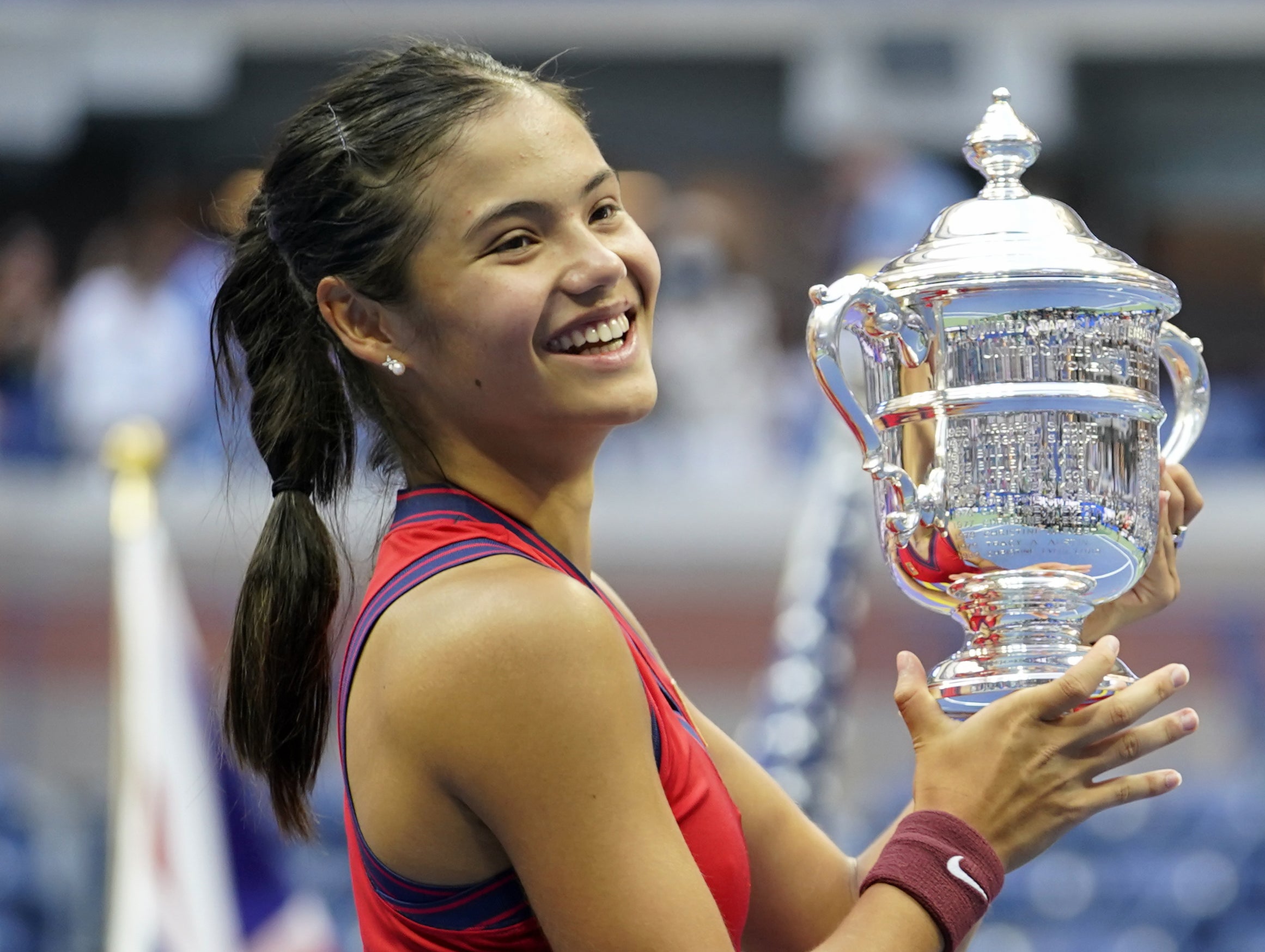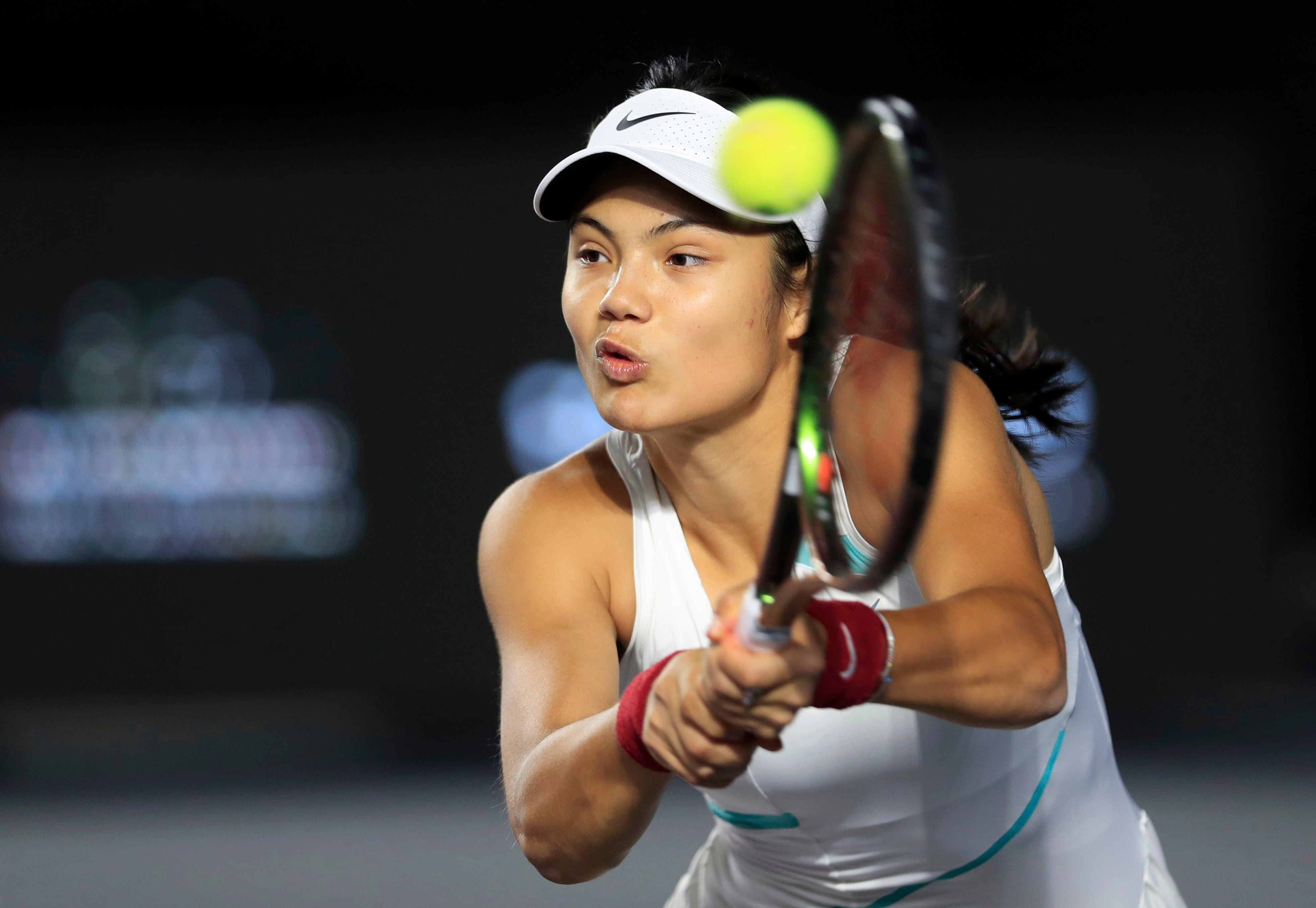Emma Raducanu’s childhood rival says she proves tennis dream is possible
Sonay Kartal is hoping to follow in her old sparring partner’s footsteps and reaching the top of the game

Your support helps us to tell the story
From reproductive rights to climate change to Big Tech, The Independent is on the ground when the story is developing. Whether it's investigating the financials of Elon Musk's pro-Trump PAC or producing our latest documentary, 'The A Word', which shines a light on the American women fighting for reproductive rights, we know how important it is to parse out the facts from the messaging.
At such a critical moment in US history, we need reporters on the ground. Your donation allows us to keep sending journalists to speak to both sides of the story.
The Independent is trusted by Americans across the entire political spectrum. And unlike many other quality news outlets, we choose not to lock Americans out of our reporting and analysis with paywalls. We believe quality journalism should be available to everyone, paid for by those who can afford it.
Your support makes all the difference.Sonay Kartal watched Emma Raducanu’s US Open triumph with the same wide-eyed disbelief as the rest of the tennis world.
But Kartal’s perspective was unique. Growing up in Brighton, the now 20-year-old quickly established herself as a major young talent, and Raducanu was her big rival.
“We grew up playing each other,” Kartal tells the PA news agency. “I think my earliest memory is maybe under-nines up until under-14s. We’d be in the same national tournaments and we’d always end up meeting each other in the finals and we’d alternate almost every week who won.”
When footage of the two young girls trading groundstrokes surfaced on social media after Raducanu lifted the title in New York, one question lingered – whatever happened to Sonay Kartal?
Injuries provide the answer. From the ages of 14 to 17, a wrist problem left Kartal struggling to pick up a racket. Then came two abdominal tears.
But she has been fit since last year and, helped by the Lawn Tennis Association’s commitment to staging more tournaments in the UK, has been making up for lost time in seriously impressive fashion.
Since returning to the tour last October, Kartal has won 26 of her 28 matches, claiming four titles from six tournaments and sending her ranking soaring to 397 – only 58 places lower than Raducanu was when she introduced herself to the world by reaching the fourth round of Wimbledon.
I think I can speak for the others who grew up playing around her that it's nothing but inspiration, a little kick that what we're all trying to achieve, it's doable, it's not a dream that's so unachievable.
Expecting something similar from Kartal this year would be unfair – Raducanu’s achievements were unprecedented – but she already has her sights set on trying to earn a Wimbledon wildcard, and the new series of home events could not have come at a better time.
She said of Raducanu’s success: “It has inspired me and I think I can speak for the others who grew up playing around her that it’s nothing but inspiration, a little kick that what we’re all trying to achieve, it’s doable, it’s not a dream that’s so unachievable. It was motivation for all of us.”
The LTA has been criticised in recent years for not investing in enough home tournaments but this year the governing body is funding 16 tournaments for both men and women on the International Tennis Federation Tour, offering precious playing opportunities for lower-ranked players.
That is in addition to the established grass-court events and doubles the opportunities offered from 2019.
“Tournaments at home, especially right now with Covid still going on, it makes our lives so much easier,” said Kartal. “And also financially, it helps a huge amount. It’s an expensive sport anyway, let alone when you add in the travel.”
Kartal has certainly taken advantage, winning tournaments last month in Birmingham and Glasgow. Over the next couple of weeks she will try to build on those successes on clay in Turkey before returning home for back-to-back tournaments in Nottingham in April.
In the final in Birmingham, Kartal defeated another promising young British talent in 16-year-old Talia Neilson Gatenby.
Neilson Gatenby is one of the teenagers who the LTA have invested heavily in through the academy system – she is among a crop of promising girls at Loughborough.
Offering experience of senior tennis to players like Neilson Gatenby is one of the aims of the LTA’s investment, and she said: “It’s so useful to have these opportunities at home.
“I am still doing my GCSEs so it is really good to not have to travel so much as it means less time away from school. I am grateful for the LTA for the wild card to give me the opportunity to play at this level.
“Until this year I have only played against junior players so this has provided me with a really great opportunity to test myself against very experienced and older players.”
The fact Raducanu is the only British woman in the top 100 shows that strength in depth remains a real problem and one that successive LTA regimes have failed to crack.

The teenager’s sudden rise to global prominence offers a golden opportunity to grow the game at all levels – a chance not taken in Andy Murray’s heyday.
LTA figures show that participation among women and girls increased by nine per cent in the months after Raducanu’s triumph, although her impact on the number of people picking up a racket may have been overstated.
Grass-roots participation had already taken an upward turn prior to the coronavirus pandemic, and tennis’ status as an outdoor, naturally socially-distanced sport helped it profit when the harshest restrictions eased.
So far, that extra interest has not waned. Coaching programmes have waiting lists and a number of coaches contacted by the PA news agency all reported good numbers among women and girls.
Making those pieces fit together into a finished puzzle is a fiendishly difficult challenge, but Kartal and Neilson Gatenby are two reasons to hope that Raducanu’s breakthrough may just have been the start.



Join our commenting forum
Join thought-provoking conversations, follow other Independent readers and see their replies
Comments